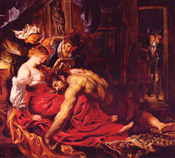
09 Apr 2007
SAINT-SAËNS: Samson et Dalila
Samson et Dalila, grand opera in three acts and four tableaux.
Andromaca: Dramma per musica in three acts.
Ermione: Azione tragica in two acts.
Ippolito ed Aricia: Tragedia in five acts.
Idomeneo: Opera seria in three acts.
Paride ed Elena: Dramma per musica in five acts.
Orphée: Opera in four acts.
Music composed by Christoph Willibald Gluck (arranged by Hector Berlioz, 1859). Libretto by Ranieri de' Calzabigi
Alceste, ou Le triomphe d’Alcide: Tragédie en musique in a prologue and five acts.
Alceste: Tragédie opéra in three acts.
Medea: Melodramma tragico in three acts.
Oedipe à Colone: Tragédie lyrique in three acts.
Elektra: Tragedy in one act.
Fedra: Dramma per musica in two acts.
Les Troyens: Grand opéra in five acts.
Die Meistersinger von Nürnberg: Music drama in three acts.
Ariadne auf Naxos, Oper with a prologue and one act. Music composed by Richard Strauss. Libretto by Hugo von Hofmannsthal.
Der Schauspieldirektor [The Impresario], Singspiel in one act, K486.
Divertimento teatrale in one act.
Andrea Chénier, an opera in four acts.
La figlia del reggimento [La Fille du régiment (‘The Daughter of the Regiment’)], Opéra comique in two acts.
L’elisir d’amore, Melodramma giocoso in two acts.

Samson et Dalila, grand opera in three acts and four tableaux.
Streaming Audio
Music composed by Camille Saint-Saëns (1835-1921). Libretto by Ferdinand Lemaire.
First Performance: 2 December 1877, Grossherzogliches Theater, Weimar.
| Principal Characters: | |
| Samson | Tenor |
| Abimélech (Abimelech), satrap of Gaza | Bass |
| The High Priest of Dagon | Baritone |
| First Philistine | Tenor |
| Second Philistine | Bass |
| A Philistine Messenger | Tenor |
| Dalila (Delilah) | Mezzo-Soprano |
| An Old Hebrew | Bass |
Setting: Ancient Gaza.
Synopsis:
Act I:
Palestine, 1150 B.C. In a square in Gaza, a group of Hebrews beg Jehovah for relief from their bondage to the Philistines; Samson, their leader, rebukes them for their lack of faith. When the Philistine commander, Abimélech, denounces the Hebrews and their God, Samson kills him and leads the Hebrews away. The High Priest of Dagon comes from the Philistine temple and curses Samson's prodigious strength, leaving with the slain man's bier. An Old Hebrew praises the returning Samson. The outer walls of the temple disappear to reveal Samson's former lover, the Philistine woman Dalila, who invites him to come that night to her nearby dwelling. She and her maidens dance seductively for Samson, who becomes deaf to the Old Hebrew's dour prophecies.
Act II:
In the vale of Sorek, Dalila calls on her gods to help her ensnare and disarm Samson, promising the High Priest to find a way to render the hero powerless. Samson appears, passionate in spite of himself; when Dalila has him in her power, she feigns disbelief in his constancy and demands that he show his love by confiding in her the secret of his strength, weeping when he refuses. Samson hears rolling thunder as a warning from God but cannot resist following Dalila inside. Not long afterward, having finally learned that the secret of Samson's strength is his long hair, she calls to hidden Philistine soldiers, who rush in to capture and blind Samson.
Act III:
In a dungeon at Gaza, the sightless Samson pushes a grist mill in a circle, praying for his people, who will suffer for his sin. He hears their voices castigating him.
During a bacchanal in the Temple of Dagon, Dalila and the High Priest taunt Samson. When they force him to kneel to Dagon, he asks a boy to lead him to the two main pillars of the temple. Samson prays to Jehovah to restore his strength, and with a mighty effort he pulls down the pillars and the temple, crushing himself and his foes.